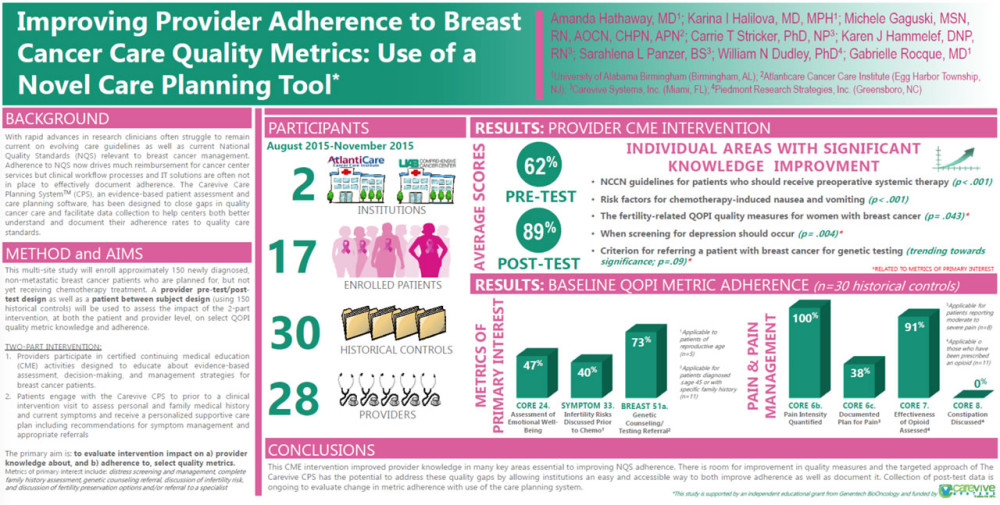
Improving Provider Adherence to Breast Cancer Care Quality Metrics: Use of a Novel Care Planning Tool
Amanda Hathaway, MD1; Karina I Halilova, MD, MPH1; Michele Gaguski, MSN, RN, AOCN, CHPN, APN2; Carrie T Stricker, PhD, NP3; Karen J Hammelef, DNP, RNs3; Sarahlena L. Panzer, BS3; William N Dudley, PhD4; Gabrielle Rocque, MD1
1University of Alabama Birmingham (Birmingham, AL);
2Atlanticare Cancer Care Institute (Egg Harbor Township, NJ);
3Carevive Systems, Inc. (Miami, FL);
4Piedmont Research Strategies, Inc. (Greensboro, NC)
Background
With rapid advances in research clinicians often struggle to remain current on evolving care guidelines as well as current National Quality Standards (NQS) relevant to breast cancer management. Adherence to NQS now drives much reimbursement for cancer center services but clinical workflow processes and IT solutions are often not in place to effectively document adherence. The Carevive Care Planning System (CPS), an evidence-based patient assessment and care planning software, has been designed to close gaps in quality cancer care and facilitate data collection to help centers both better understand and document their adherence rates to quality care standards.
Method and Aims
This multi-site study will enroll approximately 150 newly diagnosed, non-metastatic breast cancer patients who are planned for, but not yet receiving chemotherapy treatment. A provider pre-test/post-test design as well as a patient between subject design (using 150 historical controls) will be used to assess the impact of the 2-part intervention, at both the patient and provider level, on select QOPI quality metric knowledge and adherence.
TWO-PART INTERVENTION:
- Providers participate in certified continuing medical education
(CME) activities designed to educate about evidence-based assessment, decision-making, and management strategies for breast cancer patients. - Patients engage with the Carevive CPS to prior to a clinical intervention visit to assess personal and family medical history and current symptoms and receive a personalized supportive care plan including recommendations for symptom management and appropriate referrals
The primary aim is: to evaluate intervention impact on a) provider knowledge about, and b) adherence to, select quality metrics.
Metrics of primary interest include:
- distress screening and management
- complete family history assessment
- genetic counseling referral
- discussion of
- discussion of fertility preservation options and/or referral to a specialist
Conclusions
This CME intervention improved provider knowledge in many key areas essential to improving NQS adherence. There is room for improvement in quality measures and the targeted approach of The Carevive CPS has the potential to address these quality gaps by allowing institutions an easy and accessible way to both improve adherence as well as document it. Collection of post-test data is ongoing to evaluate change in metric adherence with use of the care planning system.




